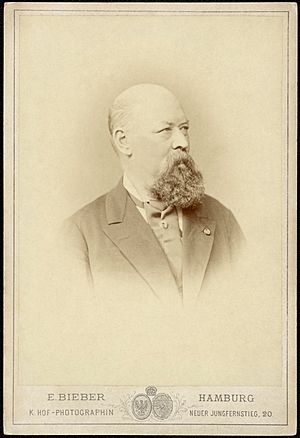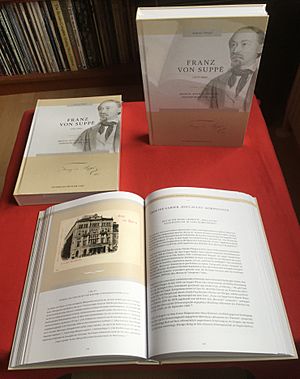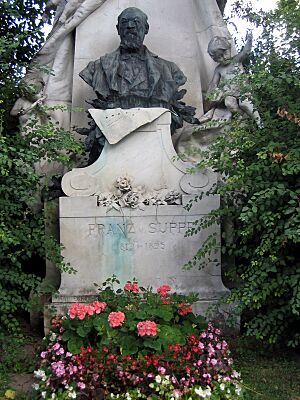Franz von Suppè facts for kids

Franz von Suppè (born Francesco Ezechiele Ermenegildo de Suppè; April 18, 1819 – May 21, 1895) was an Austrian composer. He wrote many light operas and other music for the theater. Suppè was born in what is now Split, in the Austro-Hungarian Empire. He was a composer and conductor during the Romantic period. He is famous for writing about 48 operettas.
His family name was originally Suppè with a grave accent. When he moved to Vienna, he changed his name to von Suppè to sound more German.
Life and Music Training
Franz von Suppè was born on April 18, 1819, in Spalato (now Split), which was part of the Austrian Empire. His father worked for the Austrian government, and his mother was from Vienna.
He spent his childhood in Zadar, a city in Croatia. There, he started learning music and composing at a young age. A local bandmaster and the choirmaster at the Zara cathedral encouraged his musical talent. As a teenager, Suppè studied the flute and music theory. His first known composition was a Roman Catholic mass, which was performed in a church in Zara in 1835.
From 1840, Suppè worked as a composer and conductor for Franz Pokorny. Pokorny was the director of several theaters in Vienna and other cities. In Vienna, Suppè studied music with Ignaz von Seyfried. He then conducted music in theaters, where he also had the chance to show his own operas.
Suppè wrote music for more than a hundred shows at famous theaters in Vienna. These included the Theater in der Josefstadt, the Carltheater, and the Theater an der Wien. He also helped put on important opera shows, like Meyerbeer's Les Huguenots in 1846, which featured the famous singer Jenny Lind.
Franz von Suppè died in Vienna on May 21, 1895. He is buried in the Zentralfriedhof, a large cemetery in Vienna.
Famous Works
Suppè wrote about 30 operettas and 180 other stage works, like farces and ballets. While most of his operettas are not well-known today, their overtures (the music played at the beginning) are still very popular.
His most famous overtures include:
- Dichter und Bauer (Poet and Peasant, 1846)
- Leichte Kavallerie (Light Cavalry, 1866)
These overtures have been used in many films, cartoons, and advertisements. They are also often played at "pops" concerts. Some of his operettas are still performed regularly, such as:
- Boccaccio
- Die schöne Galathée (The Beautiful Galatea)
- Fatinitza
Suppè kept in touch with his home region of Dalmatia, visiting cities like Split and Zadar. Some of his works are connected to this area, like his operetta Des Matrosen Heimkehr (The Sailor's Return), which takes place in Hvar.
After he stopped conducting, Suppè continued to write for the stage. But he also became more interested in sacred music (religious music). He wrote a Requiem (a mass for the dead) for theater director Franz Pokorny. He also composed an oratorio called Extremum Judicum, three masses (including the Missa Dalmatica), songs, symphonies, and concert overtures.
Two of Suppè's operettas, Boccaccio and Donna Juanita, were performed at the Metropolitan Opera in New York. However, they did not become regular parts of the opera shows in the United States.
Music in Cartoons
The exciting and descriptive nature of Suppè's overtures made them popular choices for animated cartoons:
- The overture Ein Morgen, ein Mittag, ein Abend in Wien (Morning, Noon, and Night in Vienna) was the main music in the 1959 Bugs Bunny cartoon Baton Bunny.
- Poet and Peasant appeared in the 1935 Fleischer Studios Popeye cartoon The Spinach Overture. It was also used in the Walter Lantz film of the same name, which was nominated for an Oscar.
- The overture to Light Cavalry was used in Disney's 1942 Mickey Mouse cartoon Symphony Hour.
The beginning of the cello solo in the Poet and Peasant overture sounds very similar to the start of the folk song "I've Been Working on the Railroad".
See also
 In Spanish: Franz von Suppé para niños
In Spanish: Franz von Suppé para niños
Images for kids
 | Kyle Baker |
 | Joseph Yoakum |
 | Laura Wheeler Waring |
 | Henry Ossawa Tanner |




